New Breed Taxi Drivers Emerge in Japan
Few will doubt that the Captain is one of the hardest working newsmen around. Waiting for a story to come to him is not his style; rather, he's out pounding the pavement, getting the facts, and putting faces on people - in essence, giving his readers a voice they can rely on even in the most difficult of times.
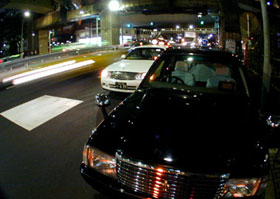 Japan's new breed of taxi driver is like-minded. Deregulation has changed the market, allowing for competition. As a result, a new go-getter mentality has emerged in this conservative industry. Join the Captain this week as he rides shotgun with this new breed of taxi driver.
Japan's new breed of taxi driver is like-minded. Deregulation has changed the market, allowing for competition. As a result, a new go-getter mentality has emerged in this conservative industry. Join the Captain this week as he rides shotgun with this new breed of taxi driver.
She seemed like a regular customer when she got in the backseat of taxi driver Kiyoaki Yoshida's cab; a woman in heavy makeup and a long evening dress is standard for Tokyo's Shinjuku entertainment district late at night. But that soon changed.
A few moments after giving him the location of where she'd like to go, she purred, "My, you look good."
Compliments are not unusual for Yoshida. After all, before he started driving a taxi, he'd used his carefully coiffed hair, sharp facial features, and continual charm to entertain ladies in a number of Tokyo host clubs. He's even had foreign female customers take his business card and - under the guise of requesting another ride - ask him for a dinner date.
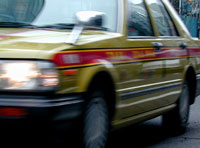 What came next though surprised even this 4-year veteran of Tokyo's streets: A pair of rather muscular arms appeared from around the back of either side of his seat, massaging his chest. With one nervous eye on the road and the other peering into the rearview mirror, Yoshida then realized that she was instead a he.
What came next though surprised even this 4-year veteran of Tokyo's streets: A pair of rather muscular arms appeared from around the back of either side of his seat, massaging his chest. With one nervous eye on the road and the other peering into the rearview mirror, Yoshida then realized that she was instead a he.
"They are the worst," Yoshida moans of his frequent encounters with cross-dressers. "But a customer is a customer."
These days, a paying customer of any kind is particularly important. Japan's ongoing recession is heavily cutting into passenger demand. This is just adding to the difficult aspects already inherent within the job. To name but a few: brutally long hours, impatient passengers, late-night drunks, and confusing streets that twist and turn without rhyme or reason. And things appear to only be getting tougher.
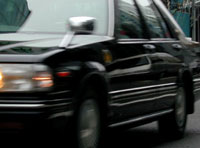 Last year's deregulation of the industry eased restrictions on minimum fares and the number of drivers on Japan's roads. Liberalization of the industry and true competition are the goals. While resisting these concepts is the norm in this industry, increasingly, a new breed of competitor is using a combination of the results of deregulation and high quality service to take a larger bite out of the taxi customer pie.
Last year's deregulation of the industry eased restrictions on minimum fares and the number of drivers on Japan's roads. Liberalization of the industry and true competition are the goals. While resisting these concepts is the norm in this industry, increasingly, a new breed of competitor is using a combination of the results of deregulation and high quality service to take a larger bite out of the taxi customer pie.
The lovable host-turned-driver, Kiyoaki Yoshida, is a maverick in the taxi business; he shuns standard protocol - waiting and reading baseball box scores with a dozen other cabbies in front of a train station, hotel, hospital, or other large place of public gathering - in lieu of going the extra mile in the name of customer service. He specializes in ingenuity and know-how.
"Working as a host is very hard," says the 38-year old, "but getting a customer to return is a simple concept - it is up to your ability to work. As a taxi driver, it is much more difficult."
To boost his odds, Yoshida employs a number of strategies, some garnered from his days of entertaining the ladies: he totes around a laptop computer to update his web page with his daily activities; he practices English for any foreigners that happen into his cab; he continually refills his billfold with a large stock of small bills to allow him to make change easily; and he'll do "little things" to get a customer to use his services again - like returning a lost mobile phone in his backseat at no charge.
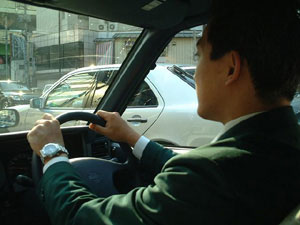 "The next week that same customer called and asked to be taken to Haneda Airport," he recalls.
"The next week that same customer called and asked to be taken to Haneda Airport," he recalls.
From a company perspective, Kyoto-based MK Taxi is leading the charge in reforming the industry. Even though the market before deregulation was already flooded with cars, they plan on adding over 5,000 cabs to their Tokyo fleet by 2005. Their strategy for gobbling market share lies in offering superior service, including non-smoking cabs, multi-lingual drivers, cars equipped with global positioning systems, a cellular phone reservation system, and their minimum fares in some parts of Japan are 25% less than their rivals.
"One coin" taxi companies, named by the fact that customers can travel the first two kilometers for a single 500-yen coin, have also hit the pavement in some of Japan's bigger cities.
Other companies are touting special accommodation services for handicapped passengers, drivers equipped with special batons loaded with stun guns to protect ladies traveling at night, and special pre-registered customer address cards which drivers can load into an onboard navigation system, allowing passengers who have had a little too much to drink to, as Kohei Kurisaki, president of Kanachu Hire, boasted to the Yomiuri Shimbum, "fall asleep without worrying about missing their destination."
Since deregulation, Yoshida estimates that the 28,000 taxis that existed in Tokyo last year have now increased to over 35,000. Previously, there had to be a bankruptcy of a taxi company for a new company to enter the market. Now companies can add to the fray right away.
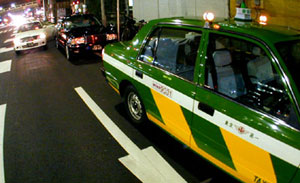 "Companies like MK Taxi are flooding the market," he says. "It is making it tough to do business. You can't generate the same revenue as before."
"Companies like MK Taxi are flooding the market," he says. "It is making it tough to do business. You can't generate the same revenue as before."
Internal conflicts have arisen at some companies because the additional drivers will mean a drop in salaries. Yoshida's seen his monthly salary fall by about 15% since deregulation took hold. (Salaries of an average Tokyo driver are already two-thirds that of a salaried worker.)
In the short-term, Yoshida believes things will get worse before they get better with deregulation being shunned as opposed to embraced. "Just like McDonald's discounted their hamburgers for a short time and then later raised them, 'one coin' companies will be forced to raise their fares as well."
Cracks have already formed as three of the initial five "one coin" operations in Tokyo have been forced to raise their fares back up to nearly pre-deregulation levels.
Yoshida is doing all he can to improve his situation. His branch of his company, Asuka Jidosha, experienced a fall in the number of drivers from 140 to 100 within its fleet through retirement or job changes since last year. This allowed him to boost his weekly shift total from two to three - each shift being a grueling 24-hour affair with a one-hour break for a short snooze or cup of coffee.
For fiscal 2001, the Ministry of Health, Labor, and Welfare reported in an occupation survey that taxi drivers rank are near the top with regard to suffering from work-related fatigue and overwork-related suicide. This doesn't slow down Yoshida.
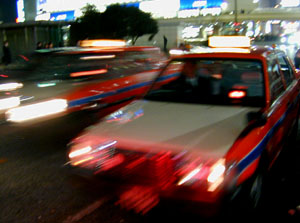 As nearly the poster child of deregulation, he sees motivation as the key for success, while at the same time shunning the value of experience: "Older drivers can't drive all night. But I am still young - I can stay out late. It's all about what you can do. In our fleet, we had a guy take the honor of being the daily top earner after being on the job for only two days."
As nearly the poster child of deregulation, he sees motivation as the key for success, while at the same time shunning the value of experience: "Older drivers can't drive all night. But I am still young - I can stay out late. It's all about what you can do. In our fleet, we had a guy take the honor of being the daily top earner after being on the job for only two days."
A lot of drivers are satisfied to receive just the base part of the their salary and ignore the extra money generated by meeting daily quotas - but not Yoshida. He's always moving, picking up roughly 40 fares a day and often exceeding the 365-kilometer daily maximum driving distance mandated by law. "It's just as easy to find customers by driving around as it is to wait," he says.
Yoshida quit his host job last year so that he could meet the strict standards of employment of his fiance's parents. This is his second tour as a taxi driver in Tokyo.
"They have their own thinking," he says of drivers who prefer the old ways. "For me, I drive to save enough money for my dream of owning a coffee shop with my future wife."
Note: Sayaka Watanabe contributed to this report from the Yokohama Bureau. Need a ride in Tokyo? Give Kiyoaki Yoshida a call at 070-5085-0586.

